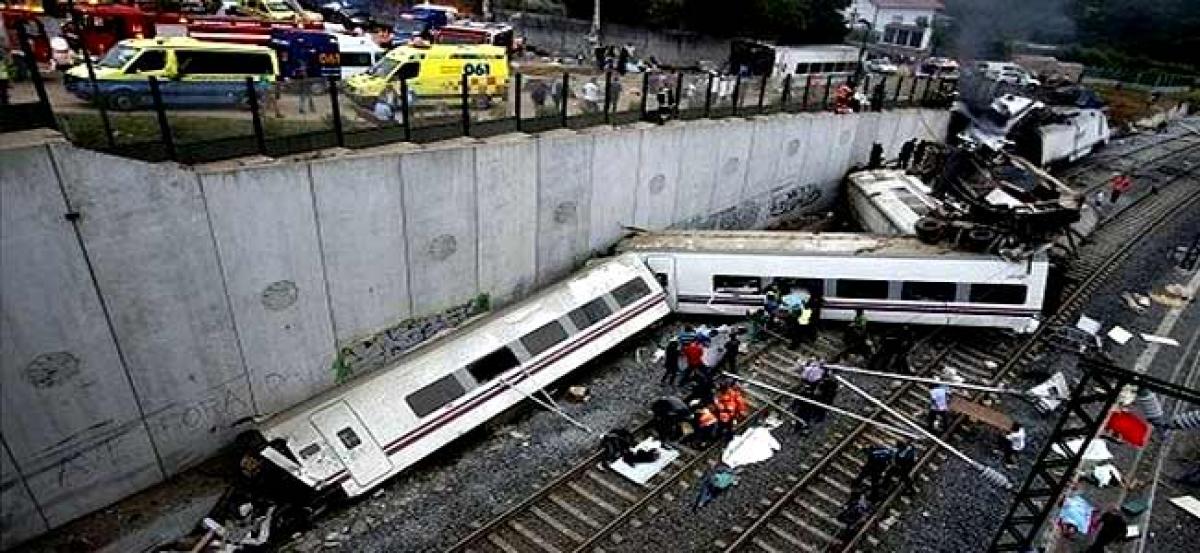Live
- Not a big fan of impact player; its holding back development of all-rounders, says Rohit Sharma
- Tanvi Malhara’s essential summer skincare mantra
- People Media Factory’s spectacular saga with TejaSajjatitled ‘Mirai’
- Squamous Cell Carcinoma (Sarees Cancer): Awareness and Prevention
- Why is Pinarayi Vijayan being treated softly by BJP, ask Rahul & Shivakumar
- Nithiin’s ‘Robinhood’ set to hit screens in December
- Hanuman Jayanti 2024: Recommended Items for Devotees
- Mirai: Teja Sajja Gears up for a New Adventure Film, Watch First Glimpse
- Satyam Rajesh’s ‘Tenant’garners attention ahead of release
- World Liver Day 2024: Understanding the Importance of Liver Health
Just In

The Amtrak train derailment in the United States has highlighted the fact that train derailment is not an India-specific problem and that all over the world, railway systems suffer accidents, according to safety experts who have commented on the train disaster.
New Delhi : The Amtrak train derailment in the United States has highlighted the fact that train derailment is not an India-specific problem and that all over the world, railway systems suffer accidents, according to safety experts who have commented on the train disaster.
This issue was also raised in Parliament when Members of the House asked Railway Minister Piyush Goyal about the progress Indian Railways had made since he got appointed, to which he replied that the progress was remarkable and noticeable. He said the incidents of derailments have come down as there was no major accident or mishap reported in the recent past.
To bring his point home, Goyal even pointed out that the derailments didn't just happen in India and were not rare in developed countries too, where one could boast of the infrastructural facilities.
Goyal's comments were substantiated the same day when at least six people were killed after an Amtrak train derailed and fell off a bridge in southwest of United States' Seattle, adding Washington to the list of major global train accidents.
In a collection of data and figures compiled from a number of web portals for the last seven years, France tops the list with as many as four major accidents between 2010 and 2017. The US is a close second with three accidents and Spain stands third.
In France's Montpellier train crash on August 17, 2016, more than 60 people were injured, while in Eckwersheim train derailment, 11 were reported dead, and 42 injured. In US' Brooklyn train crash on January 4, 2017, more than 100 people were said to be critically injured, while in Spain's Santiago de Compostela derailment, 77 were reported dead with 143 injured.
The reasons reported for these accidents include collisions between two commuter trains, technical failure, or excessive speed.
The data is nowhere close to India's. In August, 2017, 23 passengers were killed and 150 injured when the Utkal Kalinga Express derailed in Uttar Pradesh. This accident was followed by the derailment of nine coaches of the Kaifiyat Express on the intervening night of August 22 and 23, injuring around 50.
In November 24, the Patna-bound Vasco Da Gama Express train derailed near the Manikpur railway station in Uttar Pradesh, leaving three passengers dead and nine injured.
Apart from these sporadic incidents of technical failures leading to a major tragedy, India has not seen a "global train accident" in the last seven years, or at least does not feature in the top five of the list.
These infrequent instances are, however, illustrative of an accelerating decline of large public infrastructure in the country, which the Centre is certainly working upon, and most substantially on highways, airports, harbours, railways - which have not seen enough investments for decades.
Statistics show there has been a 42 per cent drop (from 85 to 49) from April 2016 to November 2017 in consequential train accidents in India.
On the contrary, the above-quoted list serves as a symbol of a deeper malaise in the society belonging to the developed nations, more so drawing attention towards failing bridges, other deadly train crashes and an erosion of major subway systems in the United States and Europe.

© 2024 Hyderabad Media House Limited/The Hans India. All rights reserved. Powered by hocalwire.com







